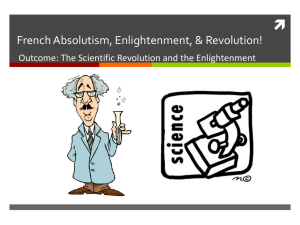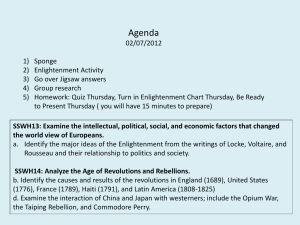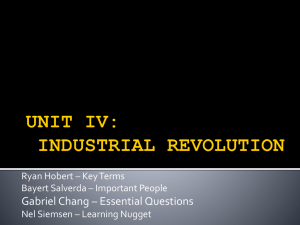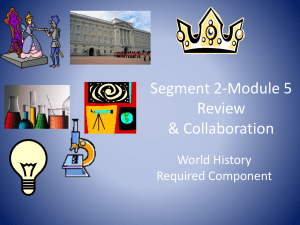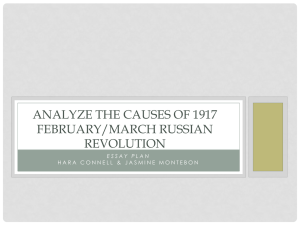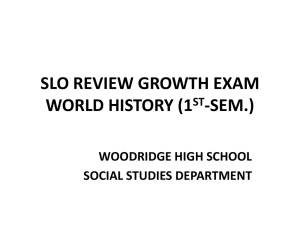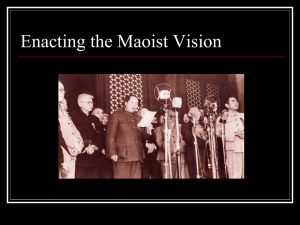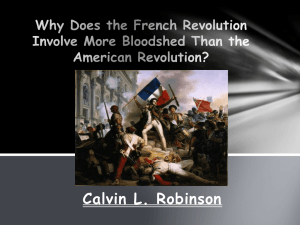Absolute Monarchies & Age of Reason Chapter 21 Sections 1, 2
advertisement
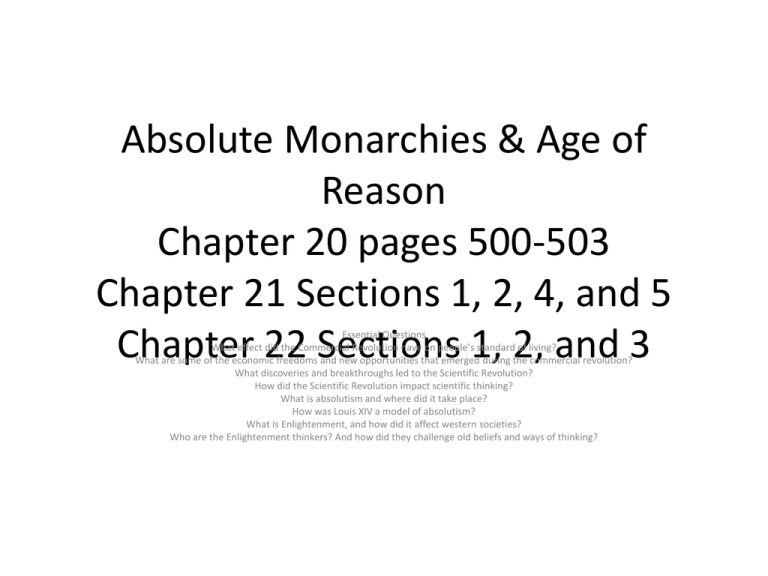
Absolute Monarchies & Age of Reason Chapter 20 pages 500-503 Chapter 21 Sections 1, 2, 4, and 5 Chapter 22 Sections 1, 2, and 3 Essential Questions What effect did the Commercial Revolution have on people’s standard of living? What are some of the economic freedoms and new opportunities that emerged during the commercial revolution? What discoveries and breakthroughs led to the Scientific Revolution? How did the Scientific Revolution impact scientific thinking? What is absolutism and where did it take place? How was Louis XIV a model of absolutism? What is Enlightenment, and how did it affect western societies? Who are the Enlightenment thinkers? And how did they challenge old beliefs and ways of thinking? Prezi Words . • • • • • • • • • • • Commercial Revolution Mercantilism Free Enterprise (Capitalism) Scientific Revolution Scientific Method Divine Right Absolutism Enlightened Despotism English Bill of Rights Constitutional Monarchy Enlightenment The Commercial Revolution • Mercantilism – Rulers increased their power by amassing gold and silver through conquest, taxes, trade, and obtain colonies • Colonies – Spain, Holland, Portugal, France, and England developed overseas empires • Free Enterprise (Capitalism) – Merchants developed new methods to finance large business ventures. They used borrowing and joint-stock companies to raise the large amounts of capital needed for these ventures. • The emergence of the middle class. Origins of the Scientific Revolution • Nicholas Copernicus – Polish scientist who took careful measurements, concluded that the Earth orbited around the sun • Galileo Galilei – Astronomer, made improvements to the telescope, supporter of Copernicus’ theory Changed Ways of Thinking • Scientific Method – New ways of scientific investigation • Rejection of traditional teachings of the Church • Robert Boyle - Pioneered the use of the scientific method in chemistry, proposed that the physical world is made up of smaller primary particles that are joined together in different ways, and developed Boyle’s Law which explains how the volume, temperature, and pressure of gas affect each other. • Sir Isaac Newton - Developed the single theory of motionthe law of universal gravitation, which states that every object in the universe attracts every other object. The degree of attraction depends on the mass of the objects and the distance between them. He wrote the book Mathematical Principles of Natural Philosophy, one of the most important books written. History Maker: Copernicus Causes of the Scientific Revolution • Renaissance discovery of new classical manuscripts leads scholars to question accepted knowledge. • Exploration broadens European horizons. • Printing press spreads ideas. • Discoveries of Copernicus and other scientists challenge accepted thinking. Impact of Scientific Revolution • Copernicus - Heliocentric Theory • Eratosthenes - Calculated the earth’s true size • Galileo - Discovered the law of the pendulum, law of gravity, laws of motion and built a telescope to look at the stars Absolutism • A monarch’s total control over his subjects. • Louis XIV is a model for other absolute monarchs. – His will was law. “I am the state.” – He interfered with economic and religious lives of his subjects. – He established standards for industry. – Forced nobles to spend most of their time at the Palace of Versailles. – Established a strong national army. • Other absolute monarchs: Peter the Great, Catherine the Great, and Henry VIII. English Civil War 1642-1649 • • • • Conflict between king and parliament. Charles I was tried and executed. Civil war was led by Oliver Cromwell. Under the principle of the “rule of law” established by the Magna Carta, King did not have consent to act alone. • Ultimately the monarch was restored. Glorious Revolution 1688 - 1689 • James II converted to Catholicism, fled to France in fear of his life. • William and Mary agreed to a Constitutional Monarch and the English Bill of Rights which established Parliament’s supremacy over the king. Absolute Monarchs in Europe European Monarchs Claim Divine Right to Rule Absolutely Long Term Causes Immediate Effects • Decline of feudalism • Rise of cities and growth of middle class • Growth of national kingdoms • Loss of Church authority Immediate Causes • • • • Religious and territorial conflicts Buildup of armies Need for increased taxes Revolts by peasants or nobles • • • • • Regulation of religion and society Large courts Huge building projects New government bureaucracies Loss of power by nobility and legislatures Long-term Effects • Revolution in France • Western European influences on Russia • English political reforms that influence U.S. democracy Concepts of the Enlightenment 1. Reason – thinkers believed truth could be discovered through logical thinking 2. Nature – it is good and reasonable, they are just there 3. Happiness – if you lived by nature’s laws you would find happiness 4. Progress – society and humankind could perfected 5. Liberty – believed society could be set free Enlightenment Thinkers • Thomas Hobbes – Wrote Leviathan in which he argued that mankind was, by nature, selfish and wicked and that people had to give up their rights to a strong ruler, through a social contract. • John Locke – Wrote Treatises on Government in which he argued that all people are born free and equal with three natural rights – life, liberty, and property and that the purpose of government was to protect these rights. • Voltaire – poked fun at traditional authority in society, government, and the church. His views on religious toleration and intellectual freedom influenced the leaders of the American and French Revolutions. Enlightenment Thinkers continued • Jean-Jacques Rousseau – believed a government should express the “general will” of the people. His book, The Social Contract, helped to inspire the democratic ideals of the French Revolution. • Baron de Montesquieu – argued for a separation of powers in government as a check against tyranny. His book, The Spirit of Laws, encouraged the development of a system of balances later in the U.S. Constitution. • William Blackstone – A British jurist, he gave the first university lectures on English common law. His classic Commentaries on the Laws of England is best known description of the doctrines of English law; it became the basis of university legal education in England and North America. Monarchs and Enlightened Thinkers • Describe the accomplishments or beliefs of the following people. – King Louis XIV – Peter the Great – Thomas Hobbes – John Locke – Baron De Montesquieu – Jean-Jacques Rousseau Commercial Revolution • Mercantilism – Rulers increased their power by amassing gold and silver through conquest, taxes, trade, and obtain colonies • Colonies – Spain, Holland, Portugal, France, and England developed overseas empires • Free Enterprise (Capitalism) – Merchants developed new methods to finance large business ventures. – They used borrowing and joint-stock companies to raise the large amounts of capital needed for these ventures. Absolute Monarchy • Factors leading to growth of royal power: • A Caste Study in Absolute Monarchy – King Louis XIV of France: – His will was law – He permitted no criticism of his rule. – He permitted criticism of his rule. – Built Versailles Palace to house nobles. – Developed a large and powerful army. Limited Monarchy in England • Traditional checks on English king’s power: – Magna Carta (1215) limited kings’ power. – English Parliament (legislature). • Henry VIII and Elizabeth I ruled with Parliament. • James I favored divine right. His son Charles, tried to rule without Parliament. • English Civil War – Parliament defeated and executed Charles I in 1649. • Glorious Revolution – James II was overthrown. • English Bill of Rights – Stated supremacy of Parliament and the rights of subjects. • John Locke – justified Glorious Revolution. He stated that subjects have a right to rebel against an oppressive government. • William Blackstone – Summarized English law. Scientific Revolution • Changed ways of thinking – New ways of scientific investigation (scientific method) – Rejected traditional teachings of the Church – Robert Boyle – Investigated gases – Isaac Newton – Laws of gravity Enlightenment • Applied human reason to society – Questioned role of Catholic Church – Rejected traditional teachings of the Church – Opposed hereditary privileges – Sought to reform society • Leading Enlightenment thinkers: – Voltaire – Baron de Montesquieu – Jean-Jacques Rousseau Long Term Causes •Decline in feudalism •Rise of cities and growth of the middle class •Growth of national kingdoms •Loss of Church authority Immediate Causes •Religious and territorial conflicts •Building of armies •Need for increased taxes •Revolts by peasants no nobles European Monarchs claim divine right to rule absolutely Immediate Effects •Regulation of religion and society •Larger courts •Huge building projects •New government bureaucracies •Loss of power by nobility and legislatures Long-Term Effects •Revolution if France •Western European influence on Russia •English political reforms that influence U.S. democracy Absolute Monarchies and the Age of Reason Commercial Revolution Age of Kings Scientific Revolution Enlightenment Mercantilism – gold and sliver Increased trade Join stock companies Helped enriched life Increased standard of living Introduced new products Free enterprise system Growth of royal power Weakened nobility Absolute monarchy - Thomas Hobbes - King’s will was law - Peter the Great - Divine Right – Louis XIV Limited Monarchy in England - John Locke – social contract - English Bill of Rights - English Civil War - Glorious Revolution – James II Scientific method Isaac Newton – experiments on Gravity Robert Boyle – experiments on gases Questioned traditional institutions Enlightened despots - Voltaire - Montesquieu - Rousseau Applied human reason to society - Catherine the Great - Frederick the Great


